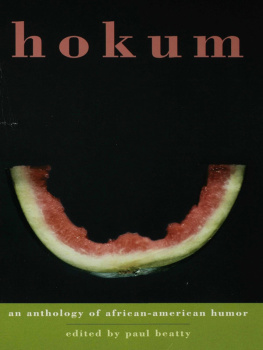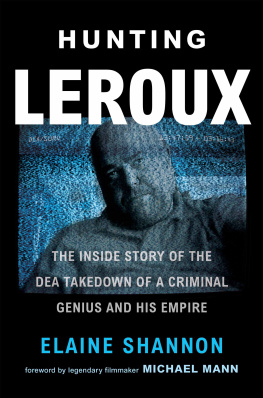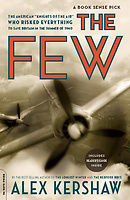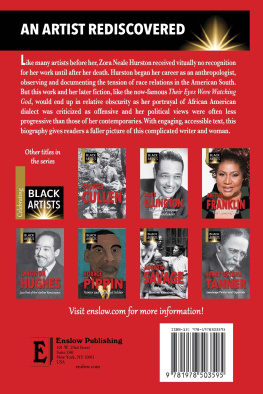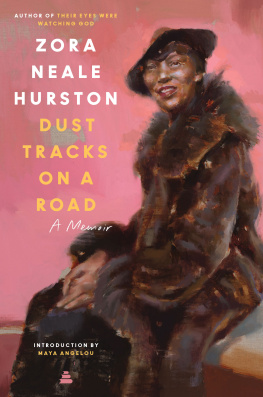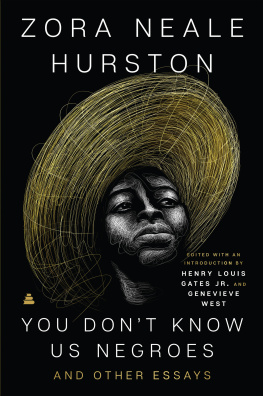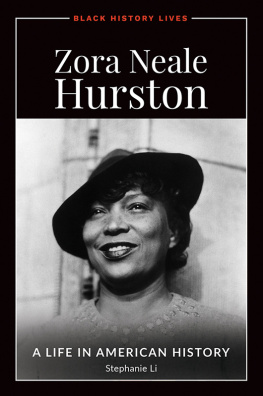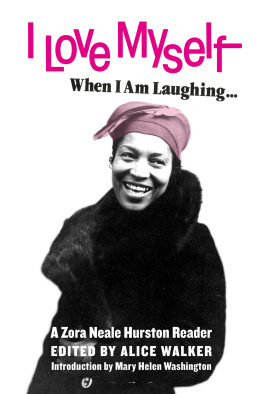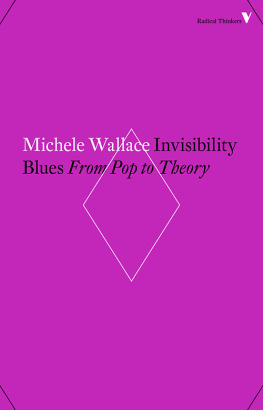hokum
hokum
an anthology of african-american humor
edited by paul beatty
BLOOMSBURY
Copyright 2006 by Paul Beatty
All rights reserved. No part of this book may be used or reproduced in any manner whatsoever without written permission from the publisher except in the case of brief quotations embodied in critical articles or reviews. For information address Bloomsbury Publishing, 175 Fifth Avenue, New York, NY 10010.
All pieces reprinted by permission.
Permissions information is listed in full on pages 463468.
Published by Bloomsbury Publishing, New York and London
Distributed to the trade by Holtzbrinck Publishers
All papers used by Bloomsbury Publishing are natural, recyclable products made from wood grown in well-managed forests. The manufacturing processes conform to the environmental regulations of the country of origin.
Library of Congress Cataloging-in-Publication Data
Hokum : an anthology of African-American humor / edited by Paul Beatty.
1st U.S. ed.
p. cm.
eISBN: 978-1-59691-716-3
1. African American wit and humor. 2. American literature
African American authors. 3. African AmericansLiterary collections.
I. Beatty, Paul.
PN6231.N5H65 2006
817.008/0896073dc22
2005048183
First U.S. Edition 2006
1 3 5 7 9 10 8 6 4 2
Typeset by Hewer Text UK Ltd, Edinburgh
Printed in the United States of America by Quebecor World Fairfield
contents
People laugh when you fall on your ass.
What's humor?Jean-Michel Basquiat
B ack in college a friend once asked if she could tell me a joke. A sure sign of a bad joke is one which requires permission to be granted in order for it to be told, but I agreed. After all, she'd put up with me stalking her for a semester and a half; the least I could do was listen to a quip that, judging from the "Okay, okay... wait a sec" preamble and her finally resorting to reading the joke from what looked to be a mimeographed first-day-of-class handout, was going to be a groaner.
"Okay, I'm ready. You listening?"
"If listening means I haven't choked you to death yet, then yes."
"All right, two black guys, George Washington Robinson and Roosevelt Lincoln Kennedy..."
I smirked, and a noise that sounded like something between a chuckle and a snort rumbled from my throat.
"You're laughing. I knew it!"
"Knew what?"
"Professor Boskin said you'd laugh."
"Professor Boskin? Who's Professor Boskin?"
"Today in class he said there were forms and styles of humor that only people of certain demographic groups find funny."
"What group, and more importantly what joke?"
"You're in the African-American group and you laughed at a joke designed to appeal to African-Americans."
"You haven't even gotten to the punch line yet."
"That's the joke."
" 'Two black guys, George Washington Robinson and Roosevelt Lincoln Kennedy,' that's the entire joke?"
"You laughed, so it must be."
"I was laughing to please you."
"I forgot. You don't have a sense of humor."
"If I had a sense of humor, I'd be laughing my ass off that you and Professor Boskin would think that anyone African-American or otherwise would think that two black guys named George Washington Robinson and Roosevelt Lincoln Kennedy is funny. That's the real joke."
"Okay, fine, but then why is it supposed to be funny?"
Why indeed? If it was so damn funny, why would Lincoln Theodore Monroe Andrew Perry have adopted Stepin Fetchit as a stage name? That disconnect between our humors has stayed with me for some time, and although I slightly exaggerate this twenty-some-odd-year-old conversation for effect, it's a fair example of how, over time, my sense of humor has developed through a confluence of resentment and unsated libido. I didn't find a joke about two black guys named after dead American presidents funny, partly for reasons of minstrel triteness, but mostly because I resent the idea of a people, in this case African-Americans, being thought of as having not a collective consciousness but a collective funny bone. I especially resented that the omnipotent whiteness of the joke's reference point had nothing to be resentful about. The joke is dependent upon a baseless fear, a fear of finding the other too similar to oneself, too American. No matter how heartfelt, white interpretation of Negro humor and Negro existence is often too black. It's Vanilla Ice slant-rhyme jive black. It's poor, beleaguered Bill Clinton pleading temporary blackness and bivouacking in Harlem among his people of non-Rwandan ancestry. It's the in toto blackness of Uncle Tom's Cabin and Check and Double Check, a blackface so pervasive, so complete that even Amos and Andy's and Topsy's palms and fingernails are shoe-polished to a grease-monkey pitch.
My resentment has become so overbearing that these days I'm unable to take anything seriously, much less humorously. Everything is satirical. Not Mad magazine satirical but Orwellian dystopic. The stand-up comedians are indistinguishable from the trade paperback satirists and the round-table news pundits shooting one-liners at each other like Jack Benny and Rochester. They're embittered middle-aged infants, as abrasive as Spanish-language punk rock, as perceptive as Neville Chamberlain, and about as funny as The Patriot Act: The Movie. Much of today's humor seems to be based on the "laugh or else" crime-boss-and-underlings model. A mean-spirited joke gets told and the heartiness of audience response is based not on its cleverness but on its offensiveness. Not to say offensiveness can't be funny, but everyone is so insecure we're afraid to laugh at ourselves and for anyone to laugh at us. Fuck 'em if they can't take a joke. Fuck 'em if they can't tell a joke. Fuck 'em if you can't fuck 'em.
Two guys, their names are Eleanor Madonna Nixon and Deng Xiaoping O'Malley. They may be guys, women, transsexuals, omnisexual, Hopi, black, Latin, white, transracial, Cablinasian, selfish, stupid, Republicans, or other, in any combination and permutation, but nothing would make me happier than if they were funny. Apart from the five minutes of weekly brilliance on Chappelle's Show, the Onion newspaper, Sarah Silverman, and George Lopez, there isn't much to laugh at these days. The best I can hope for is to chance upon some unintentional comedy. Nothing the chitlin circuit Kings of Comedy have said in the past five years was funnier than football Hall of Famer and angry black-man-in-residence Jim Brown's response to a radio host's suggestion that he calm down and enroll in an anger management class: "What are you talking about, man? I teach anger management!" No one brought more levity to 9/11 than Christine Whitman, ex-governor and then administrator of the Environmental Protection Agency, when she stood amid the still-smoldering ruins of the World Trade Center and calmly assuaged my downtown New Yorker paranoia with, "We are very encouraged that the results from our monitoring of [cough, cough] air quality and drinking water conditions in both [ahem, ahem, aaackk] New York and near the Pentagon show that the public [pant, gasp] in these areas is not [wheeze] being exposed to excessive levels of asbestos or other harmful substances. Given the scope of the tragedy from last week, I am glad to reassure the people of New York and Washington, D.C., that their [hack, cough, gasp, hack] air is safe to breathe and their water is safe to drink." And then there's Iron Mike Tyson, the Henny Youngman of unintentional humor, who after losing to Lennox Lewis answered a question about his boxing legacy by saying, "I guess I'm gonna fade into Bolivian."
I compiled this book because I'm afraid that American humor is fading into Bolivian and that Will Smith, the driest man alive, will be historicized as the Oscar Wilde of Negro wit and whimsy. Three years ago I was in a Berlin bar commiserating with an expatriate black author of some renown. We were doing what African-Americans who live abroad do, which is to castigate the entire black race (apart from ourselves and Thelonious Monk and Harriet Tubman, of course) and all of its overhyped contributions to society, from fire to record scratching to the touchdown celebration. Inevitably, after a few red wines and a sound thrashing of Stanley Crouch, I slurred, "Niggers ain't as funny as they used to be."
Next page
